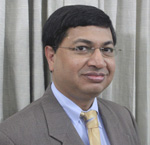The Finance students in the College of Business attended a three day intensive program on Islamic Banking and Finance, delivered by Professor Kabir Hassan from the University of New Orleans, USA
Finance students in the College of Business attended a three day intensive program on Islamic Banking and Finance from April 1st – 3rd. The program was taught by world renowned expert on Islamic Finance Dr Kabir Hassan from the University of New Orleans, USA. Dr. M. Kabir Hassan is a financial economist with consulting, research and teaching experiences in Islamic Finance, development finance, money and capital markets, corporate finance, investments, monetary economics, macroeconomics and international trade and finance. He has published five books, and over 70 articles in refereed academic journals. Dr KAbir also has extensive consulting experience with organisations such as USAID, the World Bank, IDB, ICDT, Government of Bangladesh, USIA and the Nathan Associates and was Visiting Scholar with the International Monetary Fund (IMF).
The three day program was designed to help students better understand the fundamental religious principles underlying modern Islamic finance and banking, as well as the diversity and adaptive mechanisms of Islam. The first day of the program provided an overview of Islamic Banking and Finance and addressed issues such as the basis of Islamic Banking and Finance, the Shariah, the conceptual arguments for Islamic Banking and Finance, the development of Islamic Banking and Finance industry, and the operating structures of Islamic Banking and Finance Industry.
The second day of the program examined the different financial modes used by Islamic Banks including sources of funds and uses of funds, fixed income versus profit-loss sharing modes of finance, Shariah standards for mudaraba, musharaka, and murabaha. Dr Kabir also detailed the causes behind the global financial crisis and outlined how an Islamic Financial model may have lessened the economic downturn that followed the financial crisis of 2007/08.
The final day of the program looked in more depth at the prohibition of riba, the structure of tawarruq and sukuk issuance, which is growing strongly both in Saudi Arabia and the broader MENA region.
Student’s feedback on the program was extremely positive. Dr Kabir encouraged students to ask questions throughout the three day program and this encouraged a number of interactive and stimulative class discussions. As described by Ms Sara AlShowaier, a 3rd year student majoring in Finance, “The islamic banking course was one of the most knowledgeable short courses I’ve ever attended”.
All students that attended the three day program will receive a certificate in Islamic Banking and Finance from the College of Business, AlFaisal University.














